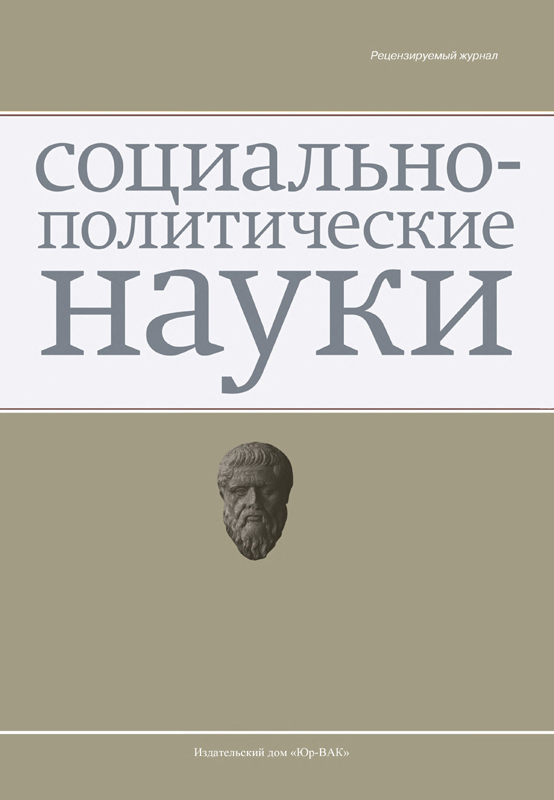Mechanisms of Electronic Democracy in Modern Russia: Conditions of Formation and Development Trends
- Authors: Ilyicheva L.E.1, Pirozhkov N.S.2
-
Affiliations:
- Institute of Public Administration and Civil Service of the Russian Presidential Academy of National Economy and Public Administration (IPACS RANEPA)
- Russian Presidential Academy of National Economy and Public Administration
- Issue: Vol 12, No 2 (2022)
- Pages: 21-26
- Section: Articles
- URL: https://journals.eco-vector.com/2223-0092/article/view/535732
- DOI: https://doi.org/10.33693/2223-0092-2022-12-2-21-26
- ID: 535732
Cite item
Abstract
In the article, the author examines the features of the digitalization of the political process in modern Russia. Attention is focused on the development of the concept of “electronic democracy”, the transformation of this phenomenon in the context of the development of modern information and communication technologies on the example of modern Russian practice. Speaking about the positive trends in the development of Internet communication between the state and society, the unresolved problem of trusting the information coming from state institutions is noted. The main methods of scientific research in this work are the ontological method, which allows to investigate the nature of the digitalization of political processes, as well as the institutional method, which allows to analyze the interaction of institutions of state power and civil society in the framework of the development of “digital interaction”.
Full Text
About the authors
Lyudmila E. Ilyicheva
Institute of Public Administration and Civil Service of the Russian Presidential Academy of National Economy and Public Administration (IPACS RANEPA)
Email: ilicheva-le@lilitcheva@mail.ru
Dr. Sci. (Polit), Cand. Sci (Philos.), Professor; Professor at the Department of Project and Program Management, Director of the Center for Public-Private Partnership of the Institute of Public Service and Management Moscow, Russian Federation
Nikita S. Pirozhkov
Russian Presidential Academy of National Economy and Public Administration
Email: nikitapirozhkov@gmail.com
post graduate of Politology, student Moscow, Russian Federation
References
- Avtsinova G.I. Policy of digitalization in modern Russia: features of formation and prospects of development. Politbook. 2019. No. 4. Pp. 6-21. (In Rus.)
- Bolshakova Yu.M. Issues of digitalization in the context of the modern stage of evolution of public administration. Power. 2021. No. 4. (In Rus.) URL:https://cyberleninka.ru/article/n/voprosy-tsifrovizatsii-v-kontekste-sovremennogo-etapa-evolyutsii-publichnogo-upravleniya (data of accesses: 14.03.2022).
- Volodenkov S.V. Transformation of modern political processes in the conditions of digitalization of society: Key scenarios. Contours of Global Transformations: Politics, Economics, Law. 2020. No. 2. (In Rus.) URL:https://cyberleninka.ru/article/n/transformatsiya-sovremennyh-politicheskih-protsessov-v-usloviyah-tsifrovizatsii-obschestva-klyuchevye-stsenarii (data of accesses: 10.03.2022).
- Popova E.A., Nochyevka A.A. Digital transformations of political management: development of online services. State and Municipal Management. Scientific Notes. 2020. No. 4. (In Rus.) URL:https://cyberleninka.ru/article/n/tsifrovye-transformatsii-politicheskogo-upravleniya-razvitie-onlayn-servisov (data of accesses: 10.03.2022).
- Pavlyutenkova M.Y. Electronic democracy and electronic government - a prerequisite for an effective state of the XXI century. URL:http://www.um.dp.ua/pdf/egoverment.pdf. (data of accesses: 10.03.2022).
- Caddy D., Verges K., McIntosh E., Coleman S. Electronic democracy: hopes and problems: Scientific and practical. ed. Organization for Economic Cooperation and Development (OED). Paris, 2004.
- Grossman L.K. The electronic republic. Reshaping democracy in the information age. N.Y.: Viking (20th Century Fund), 1995. P. 120.
- Brack A., Noble P. E-Democracy around the World: A survey for the Bertelsmann foundation. Summer, 2011. Р. 78.
- Voropanov S.A. Possibilities of applying digital technologies to mechanisms of direct democracy in modern Russia. Society: Politics, Economics, Law. 2021. No. 6 (95). (In Rus.) URL:https://cyberleninka.ru/article/n/vozmozhnosti-primeneniya-tsifrovyh-tehnologiy-k-mehanizmam-pryamoy-demokratii-v-sovremennoy-rossii (data of accesses: 10.03.2022).
- Nesmeyanova S.E., Kolobaeva N.E., Mochalov A.N. “Open gover- nment” and human rights. Electronic Supplement to the Russian Law Journal. 2018. No. 5. (In Rus.) URL:https://cyberleninka.ru/article/n/otkrytoe-pravitelstvo-i-prava-cheloveka (data of accesses: 10.03.2022).
- Kurochkin A.V. Innovation policy in a network society (the Northern European model). St. Petersburg: Publishing House of the Russian Academy of Sciences, 2013. P. 143.
- Konkov A.E. Digitalization of political relations: facets of cognition and mechanisms of transformation. Contours of Global Transformation: Politics, Economics, Law. 2019. Vol. 12. No. 6. Pp. 6-28. (In Rus.)
- Khoreva E.E., Burda M.A. Business transition to Digital space in the era of COVID-19. Society. Trust. Risks. Materials of the Annual International Forum. Under the gen. edit. of I.V. Groshev. Editorial board: A.V. Troitsky et al. 2020. Pp. 76-79. (In Rus.)
- Ilyicheva M.V.State and institutions of civil society: digital dominant. Moscow: Prospect, 2022. 176 p.
Supplementary files









